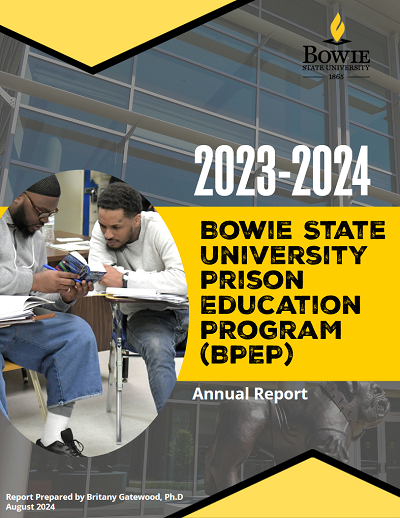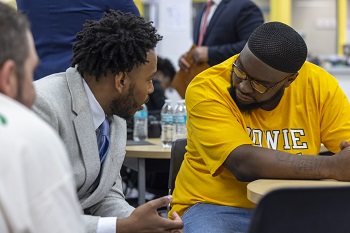Prison Education Program

Bowie State University’s Prison Education Program Annual Report for AY 2023-2024
The Department of Education designated Bowie State University as a Second Chance Pell Grant Awardee through their Experimental Site Initiative, which allows incarcerated individuals the opportunity to receive Federal Pell Grants to participate in postsecondary education and training programs.
As Maryland's first historically black public University, Bowie State University empowers a diverse population of students to reach their potential by providing innovative academic programs and transformational experiences as they prepare for careers, lifelong learning, and civic responsibility. We continue the legacy of empowering marginalized and underserved communities though Bowie State University’s Prison Education Program. BSU is actively making history as the first and only HBCU in the state of Maryland to offer a four-year degree program to incarcerated citizens: Bachelor of Science in Sociology & an optional Certificate in Entrepreneurship. Bowie’s Prison Education Program (BPEP) is an extension of our responsibility as an HBCU to empower Black people and other diverse and marginalized groups by not simply providing educational opportunities but an ecosystem of support and a culture of community, social justice, and change. We will leverage the funding and technology of adobe to strengthen the curriculum of the prison education program as well as the programs overall growth and success. As we work with incarcerated people from diverse backgrounds our mission and mantra is to elevate (ELVT): Educate to Liberate and Vow to Transform the lives of our people and thus all people.
Inaugural HBCU Prison Education Summit
April 4-6, 2025
Bowie State University
This summit will bring together HBCU leaders, policymakers, advocates, and community partners to build a Prison-to-HBCU Pipeline, expanding access to higher education for justice-impacted individuals and advancing racial equity for Black and historically marginalized communities.
Learn More
Degree Offerings
Bachelor of Science in Sociology
The Bachelor of Science in Sociology is a 120-credit hour degree program that focuses on liberal arts education. Including in the 120 credit hours is 46-47 general education courses (English, Math, Arts/Humanities, Natural Sciences and History); 36 credit hours in Sociology Core Requirements courses and 38 Free Electives. All of the 120 credit hours will be offered at Jessup Correctional Institute as part of the prison education program (note: transfer credits will be accepted from all accredited universities and colleges). All courses are three credits apart from BIOL 101 (4 credits), and all courses will be offered in either 16-week or 8-week formats.
Entrepreneurship Certificate Program
The Entrepreneurship Certificate Program is an 18-credit hour certificate program designed for students in all majors and non-degree seeking students. All 18 credit hours will be offered in six 16-week or 8-week sessions during the Fall and Spring semester at Jessup Correctional Institution as part of the Second Chance Initiative. All courses are three credits. The program will equip students with the fundamental knowledge of what it takes to launch, fund, market, and successfully operate a sustainable social and commercial competitive business/enterprise in the real world or function entrepreneurially in an existing venture. This certificate program is projected to be completed within 1-2 years.
Investment for the Future
The Prison to HBCU Pipeline addresses a critical need for incarcerated citizens in the Maryland Public Safety and Correctional Services. A majority of incarcerated citizens fail to acquire fundamental skills and the educational credentials necessary to support successful reentry. According to the Maryland Alliance For Justice Reform (2018, p. 1), "too often prisoners complete a period of incarceration without addressing their educational needs. Education behind bars reduces recidivism. Maryland could be using education more extensively and effectively to reduce recidivism, to improve public safety, to improve the lives of formerly incarcerated persons and their family members, and to build the human capital of Maryland residents." The majority of incarcerated citizens do not have the opportunity or the means to pursue postsecondary education.
Department of Justice (2016) found that incarcerated individuals who participated in correctional education were 43 percent less likely to return to prison within three years than prisoners who did not participate in any correctional education programs. It also found that correctional education increased the likelihood of obtaining employment once released. Those who participated in programming during their time behind bars thirteen percent more likely to receive a job than those who did not. Additionally, the Rand Foundation (2013) reported that four to five dollars are saved on three-year re-incarceration costs for every dollar invested in correctional education programs.
Staff
Executive Director
Charles Adams, Ph.D.
Director of Operations
Anthony Jackson, Ph.D.
Program Assistant
Britany Gatewood, Ph.D.
Site Coordinator
Ron Garrett, D.Min.
For information or to contact us, please email bpep@bowiestate.edu
